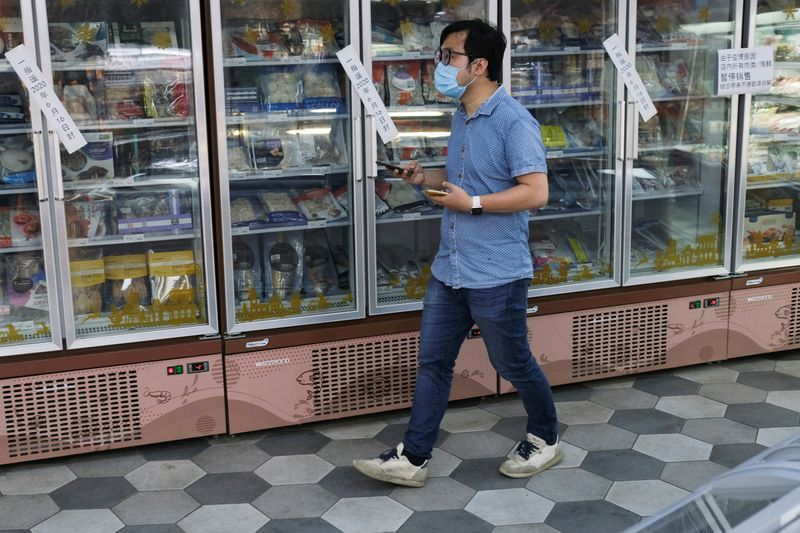By Sophie Yu and Emily Chow
BEIJING/SHANGHAI (Reuters) - China's appetite for salmon and other seafood has crashed this month, after a resurgence in coronavirus infections in Beijing was traced to chopping boards for imported salmon in a wholesale food market in the capital.
Exporters all the way to Europe are feeling the pinch as the virus scare prompts supermarkets and e-commerce players such as Taobao, JD.com and Meituan in China, the world's top consumer of frozen and fresh seafood, to slash salmon sales.
"I have cleaned out frozen fish from the refrigerator at home and won't buy more," said Ma Xuan, a government employee.
"I will wait till the origin of this new wave of virus is clear," the 40-year-old said. "Maybe I overreacted, but who knows? I don't want to risk the health of my family."
Alibaba 's (N:BABA) Taobao and JD.com (HK:9618) (O:JD) have cut imported salmon sales in Beijing, Reuters checks show, while food delivery giant Meituan Dianping (HK:3690) said it has pulled all salmon products from its platform nationally.
Meituan Grocery said it had stepped up examination of raw and fresh products, adding searches for Japanese cuisine and seafood on the Meituan app had plummeted across China since June 12, a day after the recent Beijing market outbreak started.
Ele.me, Alibaba's food delivery arm, has also halted sales of all imported seafood in Beijing.
JD.com and Alibaba did not respond to a request for comment.
Panic about the virus has extended to other farm products like beef and mutton, forcing some grocers to pull them from shelves.
China's soybean buyers have asked exporters to guarantee their cargoes are not contaminated, while overseas meat and fruit suppliers said China's customs had asked them to sign declarations ensuring the safety of their shipments.
'HOPE IS LIKE A SOAP BUBBLE'
Sushi and hotpot restaurants in Beijing that saw business pick up after virus-related curbs were eased in April are once again struggling amid the renewed worries.
Barron Qin, owner of a fish hotpot restaurant called Yufu Yuzai, said customers had been lining up everyday but now the restaurant was half empty despite not serving salmon.
"My hope is like a soap bubble, burst by the new round of the outbreak," he said.
More than 250 people have been infected in Beijing in the past two weeks, the city's worst outbreak since the virus first emerged in the central city of Wuhan in late 2019.
"Seafood consumption in June will collapse due to public panic that seafood may be the culprit for the second wave of virus," said Dan Wang, an Economist Intelligence Unit analyst.
She expects China's seafood imports to drop 3% this year.
China imported 4.44 million tonnes of seafood last year, worth 106 billion yuan (£11.9 billion), from suppliers including Russia, Peru and Vietnam, customs data shows.
(Graphic: China seafood imports, https://fingfx.thomsonreuters.com/gfx/ce/qzjpqekmkpx/China%20seafood%20imports%202016-2020.JPG)
Norway's Bravo Seafood said its exports to China initially looked promising, but the Beijing cases had changed everything despite Chinese and Norwegian authorities concluding salmon from Norway was not the source of the coronavirus.
"We have not even sent one piece of salmon to China since June 13," Bravo's Asia sales director Chen Qiao said.
"No one dares to buy salmon now no matter the origin. We expect minimal sales to China in the next one to two months."
